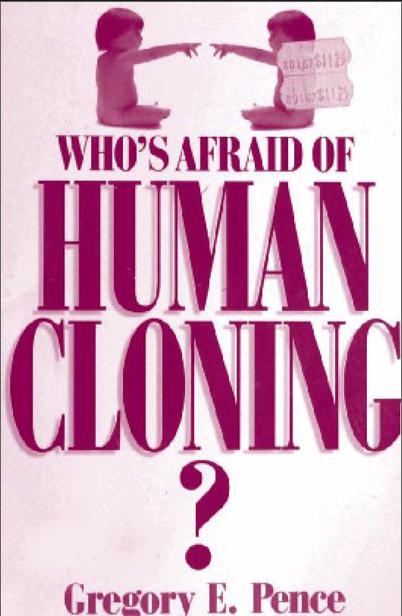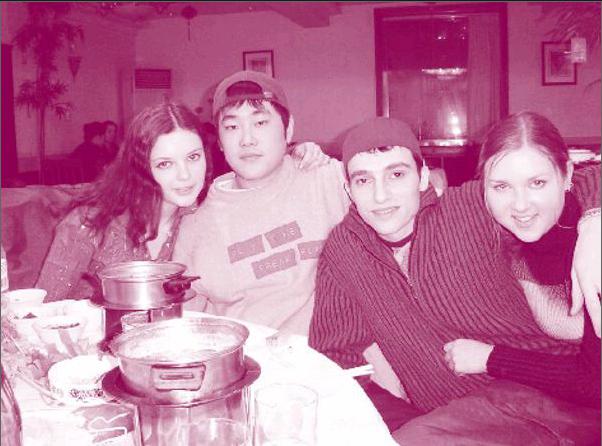跟踪导练(四)3
2015-03-16



A
Rome—Doctors and medical groups around the world last weekend reacted with strong opposition to the news that an Italian specialist is on the brink of cloning the first human baby.
Dr Severino Antinori, who is the head of a hospital in Rome, has been referred to in an Arab newspaper as claiming that one of his patients is eight weeks pregnant with a cloned baby.
Antinori refused to comment on the reports, but he said he hoped to produce a cloned embryo (卵) for implantation (植入) within two years. So far seven different kinds of mammals have already successfully cloned, including sheep, cats and most recently rabbits.
Doctors showed their doubt and were strongly opposed although they admitted that human cloning would finally come true unless there was a worldwide ban on the practice.
Professor Rudolf Jaeniscb of the Whitehead Institute for Biomedical Research at the Massachusetts Institute of Technology said, “I find it astonishing that people do this where the result can be predicted that it will not be a normal baby. It is using humans as Guinea pigs. It makes people feel sick.”
But Ronald Green, director of the Ethics Institute at Dartmouth College in the US, said it was unlikely that an eight-week-old pregnancy would lead to a birth.
So far all cloned animals have suffered from some different serious disorders, many of them dying soon after their births.
Doctors are opposed to human cloning because they are worried about the welfare of the cloned child if there is one.
“There are no benefits of cloned human beings, just harm,” said Dr Michael Wilks of the UK.
1. The underlined words “on the brink of ” in Paragraph 1 most probably mean “___”.
A. on the side of B. on the point of
C. in search of D. in favour of
2. What is the doctors general attitude to the cloning of humans?
A. They hate it.
B. They welcome it.
C. They are against it.
D. They pay no attention to it.
3. Which of the following is TRUE about cloning according to the passage?
A. Doctor Severino Antinori is strongly opposed to cloning human beings.
B. Ronald Green doubts about the future successful birth of the so-called cloned embryo.
C. Professor Rudolf Jaeniscb is carrying on an experiment on cloning an eight-week-old embryo.
D. Up to now, seven kinds of animals have been cloned, including sheep, cats, humans and rabbits.
4. Which is the best title for the passage?
A. The Success of Cloning Humans
B. The Anger at Cloning Humans
C. Failure of Cloning Humans
D. First Cloned Human
B
Friends play an important part in our lives, and although we may take the friendship for granted, we often dont clearly understand how we make friends. While we get on well with a number of people, we are usually friends with only a very few. For example, the average among students is about 6 per person. In all the cases of friendly relationships, two people like one another and enjoy being together, but beyond that, the degree of intimacy (亲密) between them and the reasons for their shared interest vary enormously. As we get to know people, we take into account things like age, race, economic condition, social position, and intelligence. Although these factors are not of main importance, it is more difficult to get on with people when there is a big difference in age and background.
Some friendly relationships can be kept on argument and discussion, but it is usual for close friends to have similar ideas and beliefs, to have attitudes and interests in common—they often talk about “being on the same wavelength”. It generally takes time to reach this point. And the more intimately involved people become, the more they rely on one another. People want to do friends favors and hate to break a promise. Equally, friends have to learn to put up with annoying habits and to tolerate differences in opinion.
Compared with marriage, there are no friendship ceremonies to strengthen the association between two people. But the supporting and understanding of each other that results from shared experiences and emotions does seem to create a powerful connection, which can overcome differences in back-ground, and break down barriers (障碍) of age, class or race.
5. According to the author, ___ .
A. friends are closer than people who just get on well with each other
B. those who get on well with each other are friends
C. everyone understands clearly how to make friends
D. every student should have 6 friends
6. Why do we consider things such as age, race, and background when we make friends?
A. They play an important part in developing a friendly relationship with people.
B. The degree of friendship between two people can vary greatly.
C. These are the most important factors to make friends.
D. Friends need to know all these things.
7. What do the underlined words “being on the same wavelength” in Paragraph 2 probably mean?
A. Having the same background.
B. Using the same frequency while talking.
C. Having similar ideas, beliefs, attitudes and interests.
D. Keeping the same friendly relationship as other people do.
8. To strengthen friendly relationship, people ___ .
A. must hold friendship ceremonies
B. have to get rid of differences in background
C. should make friends with those who are of the same age and race
D. should support and understand each other through shared experiences and emotions
从下列方框里10个单词中选择8个适当单词的正确形式填入下列各句中,使其句意完整。每个单词只使用一次。
belong bottom click flee lie
mention mind pace return reunite
1. John and Anne ____ with each other as soon as they met at that meeting.
2. The robbers tried to ____ , but they were caught in the end.
3. She ____ the floor, waiting for the phone to ring.
4. A ____ will not be believed, even when he tells the truth.
5. The huge ship sank, but the couple was saved and ____ thanks to the rescue team.
6. Just remember, dont ____ my name or youll get me into trouble.
7. I refuse to ____ to any club that would have me as a member.
8. The valley was really deep and there was a stream at the ____ .
下列各句有1个错误。
1. Its so hard to meet you again. Can I buy you dinner in return your kindness? ____
2. We found many people seating in the meeting room. ____
3. The boss has promoted Tom, but Tom didnt mention have been promoted. ____
4. What are you getting on with your new friends at the new school? ____
1. 这位母亲衷心感谢那位救了她儿子性命的人。
2. 在警察的帮助下,昨晚她和她的孩子们得以再度团聚。
3. 他给我买了条漂亮的围巾,作为回报,我给他做了顿可口的饭菜。
4. 与一个喜怒无常的人相处是很困难的。
1. I would like to apply for the position ___ in your advertisement in Times of July 22.
A. to be mentioned B. having mentioned
C. mentioning D. mentioned
2. ___ not to miss the flight at 15:00, the manager set out for the airport in a hurry.
A. Telling B. Told
C. To told D. Having told
3. Those animals do no ___ to anyone and it is wrong to ___ them.
A. hurt; harm B. wound; hurt
C. harm; hurt D. harm; wound
4. — The maths exam is not difficult, is it?
— ___ . Even Tom ___ to the bottom students passed it.
A. No; belonged B. Yes; belonged
C. No; belonging D. Yes; belonging
5. ___ there more than once, the old professor offered to show us around the newly-built library.
A. To be B. Being
C. To have been D. Having been
6. You need money and time, and ___ , you need to work hard.
A. in turn B. in case
C. in return D. in addition
7. Jane, ___ quite a little money, was able to buy her mother a new washing machine as a birthday present.
A. having saved B. to have saved
C. saving D. save
8. ___ you fall into a bad habit, its very hard for you to get rid of it.
A. As soon as B. At once
C. All at once D. Once
Some years ago when I was in my first year in college, I heard Salome Bey sing for the first time. The moment was exciting. Salomes 1 filled the room and brought the theater to life. I was so 2 that I decided to write an article about her.
I 3 Salome Bey, telling her I was from Essence magazine, and that I wanted to meet her to talk about her career. She 4 and told me to come to her studio next Tuesday. When I hung up, I was scared out of my mind. I 5 I was lying. I was not a writer at all and hadnt even written a grocery list.
I interviewed Salome Bey the next Tuesday. I sat there 6 , taking notes and asking questions that all began with, “Can you tell me...” I soon realized that 7 Salome Bey was one thing, but writing a story for a national magazine was just impossible. The 8 was almost unbearable. I struggled for days with draft after draft. Finally I put my manuscript (手稿) into a large envelope and 9 it into a mailbox.
It didnt take long. My manuscript 10 . How stupid of me! I thought. How could I 11 in a world of professional writers? Knowing I couldnt 12 the rejection (拒绝) letter, I threw the unopened envelope into a drawer.
Five years later, I was moving to California. While cleaning my apartment, I 13 the unopened envelope. This time I opened it and read the editors letter in 14 :
Dear Ms Profit,
Your story on Salome Bey is fantastic. Yet we need some relevant materials. Please add those and return the article immediately. We would like to publish your story soon.
Shocked, it took me a long time to 15 . Fear of rejection 16 me dearly. I lost at least five hundred dollars and failed to have my article appear in a major 17 . More importantly, I lost years of 18 writing. Today, I have become a full-time writer. Looking back on this 19 , I learned a very important lesson: You cant 20 to doubt yourself.
1. A. joy B. voice C. speech D. smile
2. A. proud B. confident C. satisfied D. moved
3. A. visited B. emailed C. phoned D. interviewed
4. A. agreed B. refused C. hesitated D. paused
5. A. replied B. discovered C. explained D. knew
6. A. seriously B. patiently C. nervously D. quietly
7. A. dreaming B. fooling C. inviting D. interrupting
8. A. hardship B. failure C. comment D. pressure
9. A. dropped B. lost C. sent D. tore
10. A. disappeared B. returned C. spread D. improved
11. A. compare B. struggle C. survive D. compete
12. A. ignore B. deliver C. face D. receive
13. A. put down B. found out C. came across D. made up
14. A. disbelief B. anxiety C. doubt D. panic
15. A. recover B. prepare C. escape D. concentrate
16. A. encourage B. cost C. hurt D. scold
17. A. novel B. paper C. magazine D. story
18. A. constant B. endless C. typical D. enjoyable
19. A. experience B. success C. benefit D. accident
20. A. attempt B. afford C. expect D. pretend
